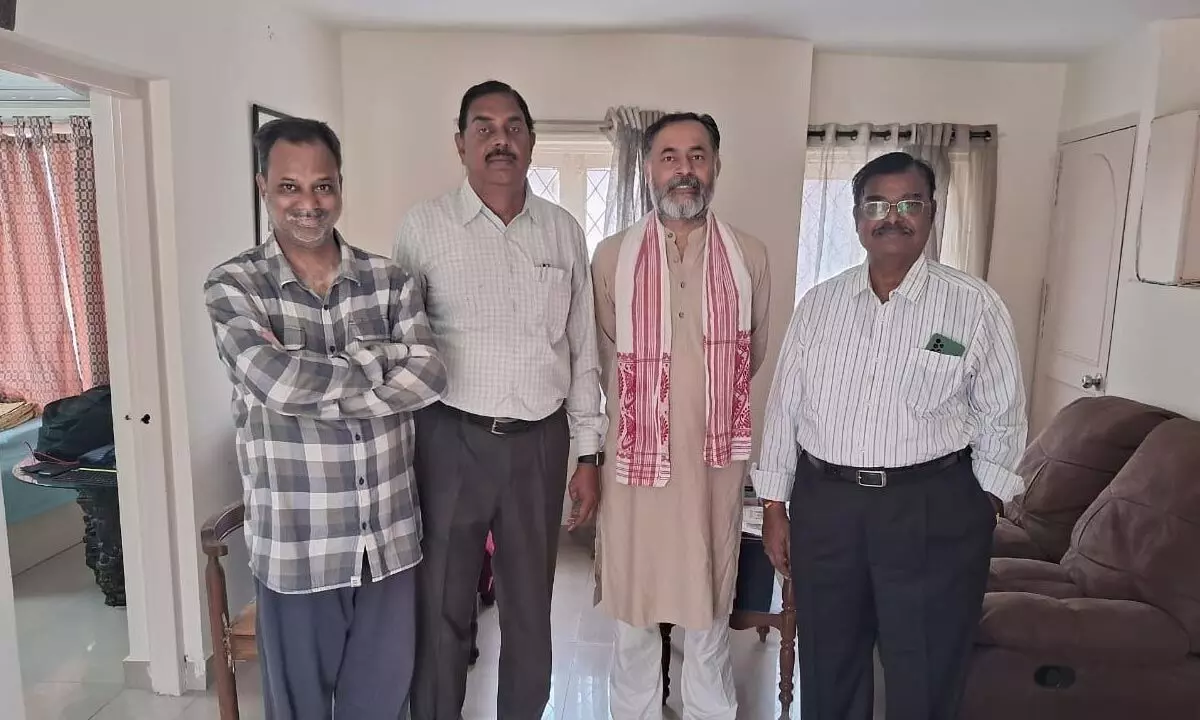Comprehensive development strategy needed to address root causes

Resource persons on drought study
Resource persons stress on long-term measures such as sustainable water management, agricultural diversification and infrastructure development
Anantapur/Puttaparthi: Even as severe drought stares at farmers in the erstwhile Anantapur district, resulting in depletion of groundwater table, crop losses triggering migration and necessitating interest waiver on crop loans, there is a necessity of a comprehensive development strategy to address the root causes of drought and its impacts.
This strategy may include long-term measures such as sustainable water management, agricultural diversification and infrastructure development to build resilience in the face of drought, according to resource persons on drought assessment and mitigation Dr M Suresh Babu, Praja Science Vedika, Dr Yogendra Yadav, Swaraj Abhiyan, Dr Pankaj Pushkar, Bharath Jodo Abhiyan Prof G Venkata Siva Reddy, convenor of Backward Region Development.
The joint study underscores the need to assess the impact of the drought situation in Anantapur district, focusing on the broader context of rural livelihoods.
Key issues to be addressed include the depletion of groundwater resources, low crop production and increasing migration in search of alternative livelihood activities.
The study primarily relies on primary data indicating that researchers gather information directly from the field. Secondary data from various sources, including government reports, local newspapers/media, and non-governmental organisations (NGOs) involved in drought-proofing activities is also utilised. The fieldwork is divided into two main stages.
During the first phase, visits are made by resource persons to numerous drought-hit villages in Anantapur district to gain an overview of the situation.
The fieldwork involves the collection of documentary sources and interviews with key stakeholders in the visited villages. The fieldwork aims to develop a broad understanding of the resources, the affected population and their coping strategies. Interviews with key stakeholders help gather insights into the responses of the State government to the drought situation.
Chronic drought characterised by deficiency in rainfall leads to the extraction and successive depletion of natural resources. This has adverse effects on agricultural production, livestock and human living conditions resulting in a loss of output and decreased farm incomes.
Prolonged periods of drought may lead to the desertification of land in the future, affecting both agricultural production and the livestock population.
Traditional occupations like agriculture, cattle and sheep rearing are still prevalent in Anantapur district, though in decline. Farmers adapt their irrigation and cropping practices in response to changing rainfall patterns, but these changes are often short-term and focused on immediate survival rather than long-term preparation.
While traditional crops face challenges due to water deficit, commercial crops and hi-tech agriculture are seen as promising sources of growth. Changes in cropping patterns, including a shift towards commercial crops, have implications for food security. The diversion of land from coarse cereals, staple food grains in drought-prone areas, is highlighted as a concern.
Vulnerability to market fluctuations: Commercial crops while increasing farmers’ incomes make them more vulnerable to market fluctuations. This uncertainty affects farmers’ ability to meet both food security needs and achieve certainty in returns from commercial crops. In response to severe drought conditions, farmers adopt coping strategies such as alternative cropping methods.
In Nallamada mandal in the erstwhile Anantapur district, a significant area was dedicated to alternative cropping systems during the drought season resulting in higher yields compared to groundnut.
The average groundwater level in Anantapur district has been decreasing, with a drop of 7.02 metres in 2019 and 11.08 metres in 2023. Continued drought conditions are expected to lead to a further decrease, reaching 12 metres in the coming months. Over exploitation of sand (for sale) and excessive digging of borewells are identified as the main causes of groundwater depletion.
The depletion of groundwater resources has resulted in imbalances in crop production and availability of drinking water. In Settur mandal, about 90% of the area relies on rain-fed crops, and the rest depends on borewells and wells. Due to persistent drought conditions, almost all borewells and wells in the region have dried up.
The State government and the Central government should allocate funds under the Rural Infrastructural Development Fund (RIDF) scheme. The scheme prioritises mandals with limited groundwater facilities and focuses on activities such as desilting/repair of small tanks, feeder channels and waterways.
Farmers facing drought-related losses often resort to borrowing to overcome financial challenges. The increasing indebtedness of farmers is due to loans taken during drought periods. Some farmers express hope for a government order to waive bank interest as a form of drought relief, recognising the difficulty in converting other assets into cash during drought
conditions.

